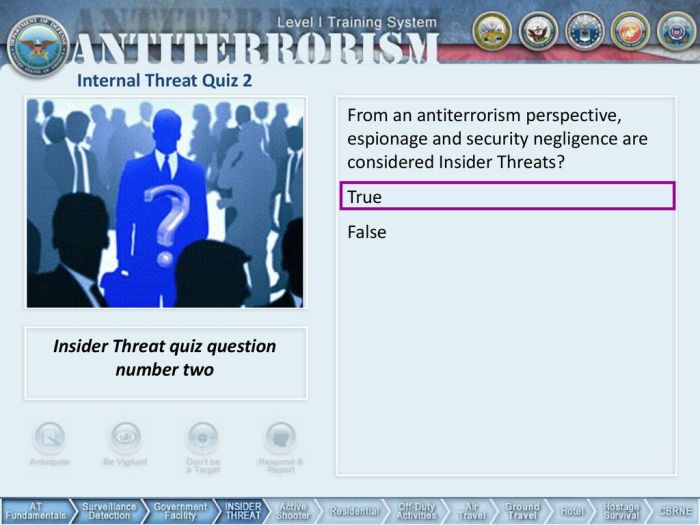From an antiterrorism perspective espionage and security negligence are not – From an antiterrorism perspective, espionage and security negligence are not isolated incidents but rather interconnected threats that can undermine national security. This essay delves into the relationship between these two factors, examining their impact on counterterrorism measures and highlighting the importance of intelligence gathering, international cooperation, and public awareness in mitigating these risks.
Espionage and Security Negligence

Espionage and security negligence are intertwined, with each potentially fueling the other. Espionage, the act of obtaining secret information without authorization, can compromise sensitive security measures and create vulnerabilities that adversaries exploit.
Negligence in security protocols, such as lax access controls or inadequate monitoring, can provide opportunities for espionage to occur. This negligence can stem from a lack of awareness, inadequate training, or complacency, allowing unauthorized individuals to access sensitive information or systems.
Case Studies
- The 2015 hack of the US Office of Personnel Management (OPM) compromised the personal information of millions of federal employees, including security clearance data. This breach was attributed to Chinese espionage, highlighting the potential impact of espionage on national security.
- The Cambridge Analytica scandal in 2018 involved the unauthorized acquisition of Facebook user data by a political consulting firm. This data was used to target political advertisements, raising concerns about the potential misuse of personal information for political gain.
Counterterrorism Measures: From An Antiterrorism Perspective Espionage And Security Negligence Are Not
Counterterrorism measures play a crucial role in preventing espionage and security negligence. These measures aim to identify and disrupt potential threats, including espionage activities.
Strategies and Effectiveness
- Intelligence Gathering:Collecting and analyzing intelligence on potential threats is essential for identifying espionage networks and preventing attacks. This includes monitoring suspicious activities, analyzing communication patterns, and collaborating with international partners.
- Enhanced Security Protocols:Strengthening security protocols, such as access controls, encryption, and intrusion detection systems, can make it more difficult for espionage agents to access sensitive information.
- Public-Private Partnerships:Collaborating with private sector entities, such as technology companies and financial institutions, can enhance counterterrorism efforts by sharing information and resources.
Challenges and Limitations
- Evolving Threats:Espionage tactics and technologies are constantly evolving, making it challenging for counterterrorism measures to keep pace.
- Privacy Concerns:Balancing counterterrorism measures with privacy concerns is crucial, as excessive surveillance can erode public trust.
- Resource Constraints:Implementing and maintaining effective counterterrorism measures can be resource-intensive, requiring significant funding and personnel.
Intelligence Gathering and Analysis

Intelligence gathering and analysis are essential for detecting espionage and security negligence. Intelligence sources include human intelligence (HUMINT), signals intelligence (SIGINT), and open-source intelligence (OSINT).
Best Practices
- Multi-Source Approach:Utilizing multiple intelligence sources provides a more comprehensive and accurate picture of potential threats.
- Timely Analysis:Timely analysis of intelligence is crucial for identifying and responding to emerging threats.
- Collaboration and Sharing:Sharing intelligence with other agencies and international partners enhances overall counterterrorism efforts.
International Cooperation

International cooperation is vital in combating espionage and security negligence. Global threats require a collective response, as adversaries often operate across borders.
Key Organizations, From an antiterrorism perspective espionage and security negligence are not
- Interpol:The International Criminal Police Organization facilitates international cooperation in law enforcement, including counterterrorism efforts.
- United Nations Security Council:The UN Security Council adopts resolutions and imposes sanctions related to counterterrorism.
- North Atlantic Treaty Organization (NATO):NATO provides a framework for collective defense and counterterrorism cooperation among member states.
Challenges and Opportunities
- Sovereignty Concerns:Balancing international cooperation with national sovereignty can be challenging, as countries may be reluctant to share sensitive information.
- Cultural Differences:Cultural differences in legal systems and law enforcement practices can impact international cooperation.
- Opportunities for Collaboration:International cooperation provides opportunities for sharing best practices, coordinating responses, and pooling resources.
Public Awareness and Education

Public awareness and education play a crucial role in preventing espionage and security negligence. An informed public can be vigilant in identifying suspicious activities and reporting them to authorities.
Public Awareness Campaigns
- Social Media Campaigns:Using social media platforms to disseminate information about espionage and security threats can reach a wide audience.
- Community Outreach Programs:Engaging with local communities and organizations can help raise awareness and build trust.
- Educational Initiatives:Incorporating counterterrorism education into school curricula and public awareness programs can foster a culture of vigilance.
FAQ Corner
What is the relationship between espionage and security negligence?
Espionage involves the unauthorized acquisition of sensitive information, while security negligence refers to the failure to implement or maintain adequate security measures. Espionage can lead to security negligence by compromising security systems or exposing vulnerabilities that can be exploited by adversaries.
How can counterterrorism measures help prevent espionage and security negligence?
Counterterrorism measures such as enhanced border security, intelligence sharing, and increased surveillance can deter espionage activities and reduce the likelihood of security breaches. By disrupting espionage networks and identifying potential threats, these measures can strengthen national security.
Why is international cooperation important in combating espionage and security negligence?
International cooperation allows nations to share intelligence, coordinate counterterrorism efforts, and develop joint strategies to address common threats. By pooling resources and expertise, countries can enhance their collective ability to detect and prevent espionage and security negligence.